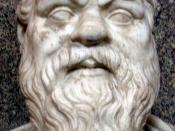Brett Walter
HUM 205
Paper # 5
"The Apology of Socrates"
and how it relates to the age old "Golden Rule":
What are truth and justice? Can truth and justice accurately be determined or considered in a case of law without first examining the validity of the court structure and entity of the ultimate judging authority? Any individual can be deemed guilty or not, at any time, for any said crime , but the true measure of one's guilt or innocence is only as valid as the court structure to which it is subject, and ultimately, the true measure of guilt or innocence is determined only by the one who is standing accused. The relevance, if any, regarding the crimes and how they coincide with that individual's values will ultimately determine their guilt or innocence regardless of what any jury's verdict or judge's sentence may be.
What I'm referring to is the individual conscience. No matter what the scenario or time period, be it 30 years ago or 2400 years ago, the human conscience that resides in each of us will provide the necessary truth and justice we seek as individuals.
The charges that were brought against Socrates were not criminal in nature, they alleged that he committed injustices by investigating the things "under the earth" along with "heavenly things"; that he made "the weaker speech the stronger"; and that he taught others to do the same.
When considering whether Socrates was innocent or guilty of the crimes with which he was charged, bear in mind the social standards of Athens during the time of his trial, the legitimacy of his accusers and the validity of the acts he allegedly committed.
One of the charges brought against Socrates was blasphemy. He was accused by his peers...


